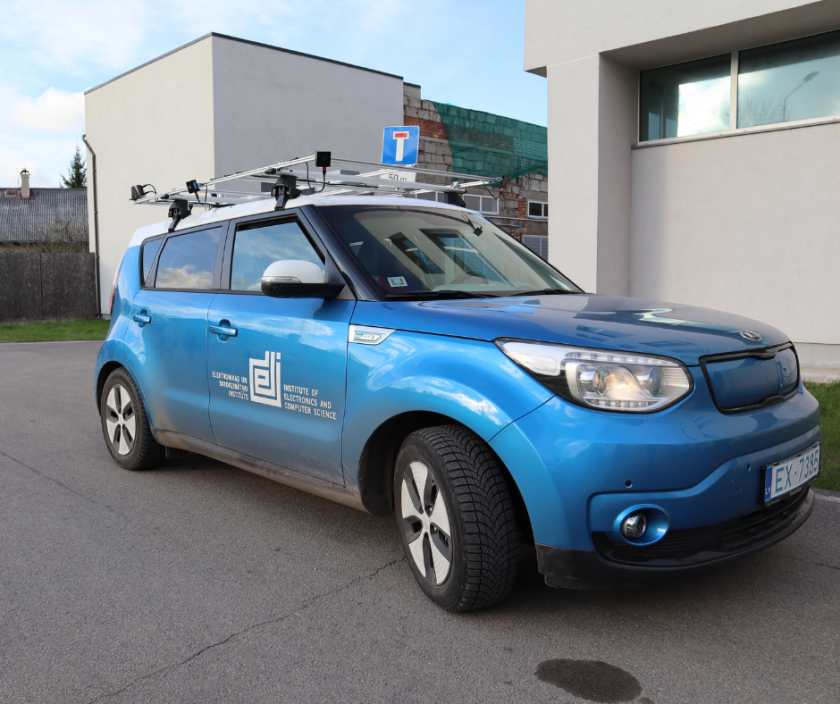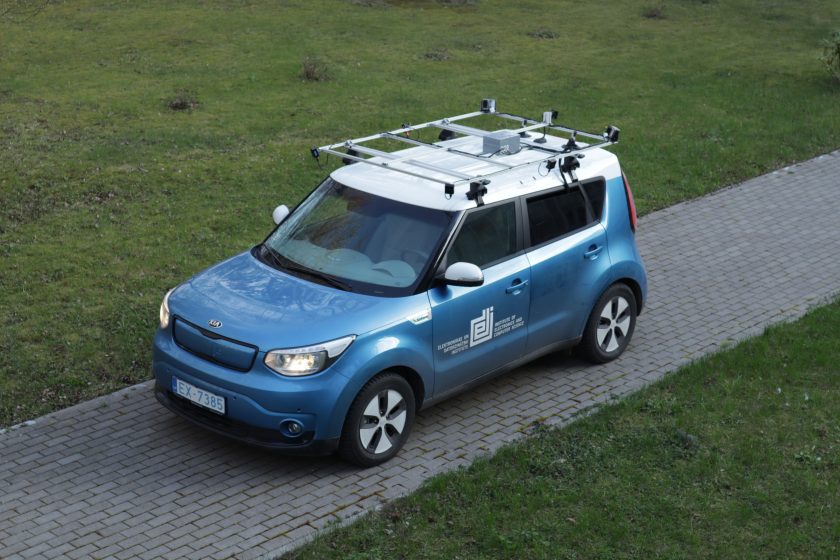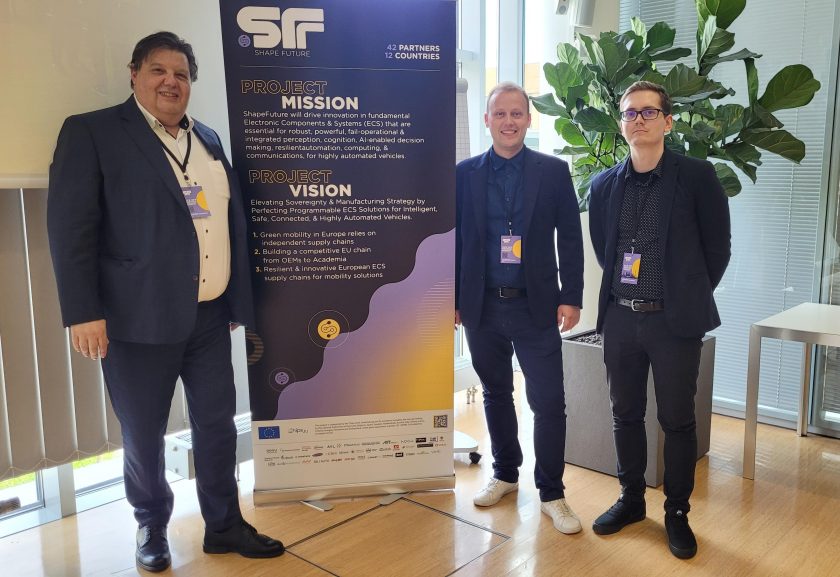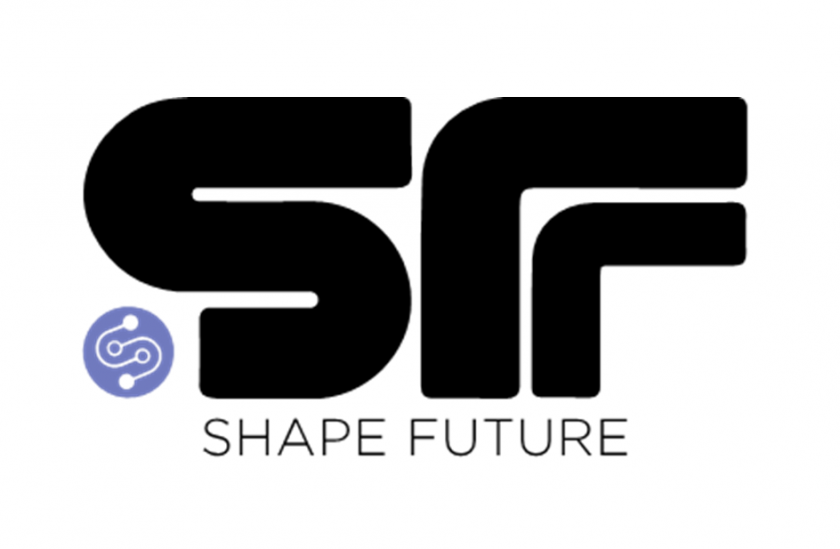
EDI is starting the implementation of a new Horizon Europe Chips-JU project “ShapeFuture”. Goal of the project – to develop ECS for resilient European automotive industry.
With the project officially starting on May 1st, 2024, and a kick-off meeting held on June 5th, 2024, in Munich, Germany, the Institute of Electronics and Computer Science (EDI) has started the implementation of a project titled Ensuring European ECS Value Chain Sovereignty through Shaping the Future of ECS for Automotive Applications (ShapeFuture) under the Horizon Europe Chips Joint Undertaking. The project aims to bring strategically important innovations in fundamental electronic components and systems (ECS) that are essential for robust, powerful, fail-operational and integrated perception, cognition, AI-enabled decision making, resilient automation and computing, as well as communications, for highly automated vehicles.

EDI Drive by Wire (DbW) demonstration vehicle
In an effort to support the European industry and automation, ShapeFuture will develop and implement new, reliable and enhanced on board perception ECS. Important milestones include commitments to considerably lower form factors and power needs by improving the efficiency of sensor integration, optimizing data processing algorithms, and leveraging cutting-edge hardware advancements such as improved radar angular resolution, radar system autonomous re-calibration, event-based sensors and asynchronous computing.
“Given the increasing global competition in the automotive sector, it is crucial to ensure that the European Union (EU) remains a key player in the field of electronic components and systems (ECS) for the automotive industry. This requires groundbreaking ideas and scientific innovations in fundamental ECS. These advancements will not only enhance the EU’s competitiveness but more importantly will also improve the performance, safety, and security of connected and automated driving. Moreover, these innovations will align with Europe’s Green Deal strategic goals. To achieve this, continuous investment in research and innovation is essential. Therefore, we are delighted to announce that EDI, in partnership with industry key players such as Infineon Technologies, TTTech Auto Germany, Toyota Gazoo Racing Europe, AVL, Nokia and many others, has initiated the ShapeFuture project. This project, with its ambitious targets, aims to make a significant contribution to Europe’s strategic objectives.” – emphasizes EDI Deputy Director for Development and Senior Researcher Dr. sc. ing. Kaspars Ozols.
Another important domain identified in the project is the sensor-human level and how ECS can add cognitive features to perception systems and improving the Human to Machine Interface (HMI). The project will contribute to the advancement of HMI interaction and cognition within perception systems by pioneering the development of innovative technologies such as compact MEMS scanner modules and radar skin, as well as the creating of advanced Ultra-Wideband (UWB) integrated circuits (ICs) and packages, on-chip firmware, and embedded software IP tailored for secure car access.
In pursuit of ECS for cognitive decision-making, ShapeFuture will enhance ECS-enabled automated driving functionalities through the development of real-time, fail-safe, and traceable decision-making solutions at the system/network level. Central to this ambition is the enhancement of autonomous vehicles’ cognitive capabilities, enabling them to navigate complex environments with precision and adaptability, including the development of autonomous vehicle management systems, enabling AI Integration for Connected and Automated Vehicles (CAVs), and autonomous vehicles with enhanced In-Out and Out-In perception.
Addressing resilient communication networks, the project will develop ECS solutions fortified against disruptions by enhancing image transmission and aggregation, implementing enhanced Cellular-Vehicle-to-Everything (C-V2X) communications for urban areas, and augmenting situational awareness in driving through augmented reality interfaces.
At the business level, ECS for technology sovereignty concerns will seek to exploit developed ECS solutions through comprehensive impact studies on stakeholder acceptance, informing policies and initiatives for EU ownership and fostering an ecosystem conducive to innovation, collaboration, and economic growth. This includes facilitating the successful integration of ECS innovations into the European market through exploitation planning, implementation, and monitoring, ensuring sustained success and EU ownership in this critical area.
EDI’s role in the project involves developing an innovative approach in perception system processing, with a focus on harnessing event-based asynchronous processing within neuromorphic hardware alongside integration of information from connected and automated vehicles (CAVs).
Edgars Lielāmurs, the research assistant at EDI, comments on advancements of event-based perception: “Sensors capable of signaling only on action and remaining silent otherwise are organically compatible with low-power constraints in mobile electronic systems. Therefore, optimizing energy efficiency with event-based sensors presents a natural progression. In line with this, EDI can leverage its expertise to create brain-inspired neuromorphic algorithms and specialized hardware, which benefits from sparse data by asynchronously processing only relevant information. Not only does this approach conserve power but also reduce the computational load on processing units, allowing for real-time, low-latency decision-making and leading to efficient and responsive mobility solutions.”

This novel strategy aims to enhance perception capabilities by capitalizing on the sparse nature of event camera and LiDAR sensor data, enabling real-time, low-latency processing while putting an emphasis on power consumption. Central to this approach is the development of dynamic object detection and tracking algorithms, facilitating accurate prediction of movements for vehicles, pedestrians, and obstacles in real-time. Moreover, EDI will explore the implementation of an edge-assisted architecture, distributing computationally intensive tasks to application-tailored digital logic on edge nodes. This design minimizes the load on central processing units and reduces overall latency, ensuring efficient processing of raw data close to the sensor. Additionally, EDI will focus on implementing sophisticated occupancy grid mapping (OGM) techniques, fusing data from various sensors to provide a comprehensive representation of the surrounding environment. These advancements aim to revolutionize mobility-aware perception systems, paving the way for efficiency in autonomous driving and intelligent transportation systems.
The Shapefuture project is led by Infineon Technologies AG, a leading semiconductor manufacturer of automotive hardware for vehicles and other applications. With a total budget of ~33 million euros the project brings together 41 partners from 12 EU countries (Germany, Austria, Finland, the Netherlands, Spain, Italy, Belgium, Lithuania, Greece, Cyprus, Latvia and Turkey), including 5 OEMs, 11 Tier-1 and Tier 2 suppliers, 13 Technology providers, and 12 research partners.
The project’s demonstrators will showcase the achievements and their capability to deliver innovations and secure future application advances in core markets for European society – Mobility, Green Deal, Digital Society, Safety and Industry.

For more information on the ShapeFuture project, please contact the project manager Dr. Kaspars Ozols (+371 67558161, kaspars.ozols@edi.lv).